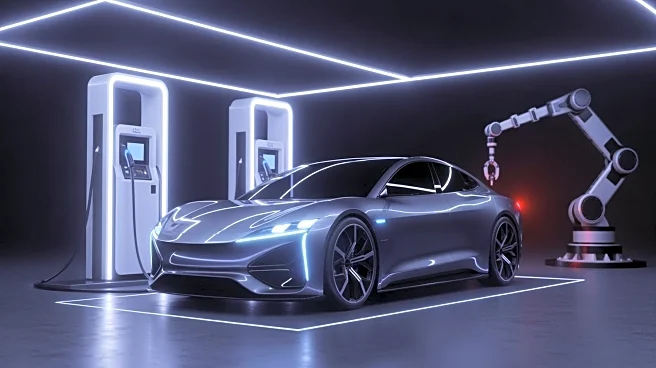What's Happening?
Tesla has reported a fourth consecutive decline in quarterly profit despite an increase in sales. The company's third-quarter earnings fell by 37% to $1.4 billion, or 39 cents per share, compared to $2.2
billion, or 62 cents per share, a year earlier. This decline in profit comes as Tesla's revenue rose to $28.1 billion from $25.2 billion, driven by a surge in electric vehicle sales and increased demand for its battery storage and electric charging businesses. The rise in sales was partly attributed to customers taking advantage of a $7,500 federal EV tax credit before its expiration on October 1. Tesla's shares fell 3.5% in after-hours trading following the announcement. CEO Elon Musk emphasized the company's focus on diversifying its business, highlighting plans to expand its driverless robotaxi service and introduce Optimus robots for home and factory use.
Why It's Important?
The decline in Tesla's profit, despite rising sales, underscores the challenges the company faces in maintaining its market position amid increasing competition in the electric vehicle sector. The expiration of the federal EV tax credit may impact future sales, raising concerns about sustained demand. Tesla's diversification into robotaxi services and AI products represents a strategic shift to mitigate reliance on vehicle sales. However, the success of these ventures remains uncertain, with potential implications for Tesla's long-term growth and profitability. The company's ability to innovate and adapt to market dynamics will be crucial in maintaining its competitive edge.
What's Next?
Tesla plans to expand its robotaxi service to up to 10 metro areas by the end of the year, starting with Austin, Texas, and San Francisco. Musk has expressed confidence in removing safety monitors from the driver's seat, signaling a significant step towards fully autonomous vehicles. The rollout of Optimus robots is anticipated to further diversify Tesla's product offerings. Investors and analysts will closely monitor these developments, assessing their impact on Tesla's financial performance and market share. The company's strategic decisions in the coming months will be pivotal in shaping its future trajectory.
Beyond the Headlines
Tesla's focus on robotaxi services and AI products highlights broader trends in the automotive industry towards automation and artificial intelligence. The ethical and regulatory implications of driverless technology will be significant, as policymakers and industry leaders navigate safety concerns and public acceptance. Tesla's diversification strategy may influence other automakers to explore similar avenues, potentially accelerating innovation in the sector. The long-term success of these initiatives could redefine transportation and manufacturing, with far-reaching effects on employment and urban planning.










